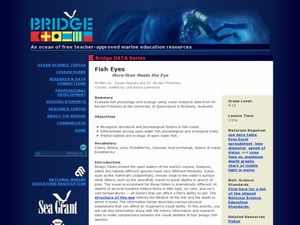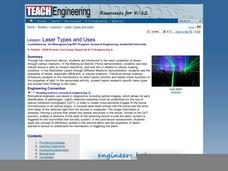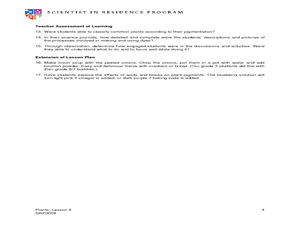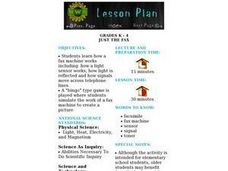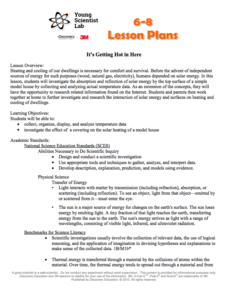Rochester Institute of Technology
Artificial Eye
Scientists in California developed a bionic eye that allows blind people to see edges of objects in black and white and costs $145,000. In the activity, groups of scholars discuss bioengineering, focusing on the human eye. They then...
American Museum of Natural History
Moon Flip Book
Flip over the phases of the moon. Using an interactive, pupils view the location of the moon relative to the sun and earth for the eight major phases of the moon. Individuals record how the moon looks through a complete cycle. Using...
US Department of Energy
Solar Cooking
Who needs a barbecue grill to cook hot dogs when you have the amazing power of the sun at your disposal? Engage young scientists in learning about solar energy with this fun activity that turns a used Pringles can into a solar powered...
Sunlight Cal-Tech
Chromatography of Plant Pigments
Through a hands-on activity, an acetone-spinach solution is pre-made and learners use this solution to separate the pigments found in spinach using chromatography. The comprehensive resource includes an analysis and conclusion questions.
Curated OER
Fish Eyes - More than Meets the Eye
Inform your class about the adaptations in fish eyes: cones, lens size, endothermy, and speed of vision. The adaptations are related to diving behavior. Junior marine scientists compare the adaptations of four different fish species to...
Wild BC
The Greenhouse Effect: Warming the Earth Experiment
First in a two-part lesson on the greenhouse effect, this lesson involves a classroom demonstration of the phenomenon, and a lab group experiment with color and absorption. Although there are easier ways to demonstrate the greenhouse...
Rochester Institute of Technology
Laparoscopic Surgery
Nobody is as smart as all of us together. In a collaborative learning activity, scholars learn it takes a team to be successful in laparoscopic surgeries. Groups complete the laparoscopic task as a team and discuss their results to...
Curated OER
Designer Colors, an Inquiry Approach to Flame Testing
Students investigate the spectroscopic colors unique to elements, and to use this information to create a specific color. They follow a detailed schematic to produce a spectroscpoe to be used in the testing.
Teach Engineering
The Amazing Aerogel
Introducing ... the aerogel. The first of a two-installment series teaches young engineers about the properties and uses of aerogels. A PowerPoint presentation provides information about this unique material to help solidify the concept.
Curated OER
Using Vegetation, Precipitation, and Surface Temperature to Study Climate Zones
Using NASA's Live Access Server, earth scientists compare the temperature, precipitation, and normalized difference vegetation index for four different locations. They use the data to identify the climate zone of each location using...
Curated OER
Laser Types and Uses
Students examine the properties of lasers and research their types and uses. For this laser lesson students view several demonstrations.
Curated OER
Obtain a visible spectra of chlorophyll a
Students become familiar with the concept of spectroscopy or the study of the interaction of matter with electromagnetic radiation. They prepare solutions and measure absorbance at different wavelengths. Pupils comprehend that mater and...
Curated OER
Using Mathematic Models to Investigate Planitary Habitablity
Students examine how the sun's intensity affects the temperature on various planets. They determine whether or not these planets could be habitable. Finally, they factor in the average albedo of the planets to determine whether or not...
Curated OER
All Those Seeing Color, Say Eye!
Students research and discuss the roles of the eye and brain in the perception of color. They watch a slideshow and complete a worksheet.
Curated OER
Leaf Chromatography
In this leaf chromatography worksheet, students separate the pigments of a leaf using paper chromatography. They answer 4 questions about their results and draw the colors they observe on their chromatogram from the leaf.
Curated OER
The Magic School Bus Makes a Rainbow
Students learn along with Ms. Frizzle's class. In this Magic School Bus lesson plan, students spin separate colors into a new color just as the Magic School Bus kids did.
Curated OER
Using Plant Pigments as Natural Dyes
Students create friendship bracelets and quilt squares. In this plant instructional activity student dye their own string and cotton material with plant pigments. Students use the naturally dyed materials to create the friendship...
Curated OER
fun with Plants that We Use
Students become familiar with the products made from various plants. In this plants lesson, students experiment with natural dyes from plants. Students complete a list of things made from plants. Students answer questions about plant...
Curated OER
Environmental Issues
In this environmental issues worksheet, students are given 10 current topics that are problems in our environment today. They complete sentences about each topic by filling in the blanks with the appropriate terms. Some of the issues...
Curated OER
Wax On, Wane Off
Young scholars explore the Earth's only natural sattelite, the moon. They view a demonstration using tennis balls of the waxing crescent moon, waxing gibbous moon and a lunar eclipse.
Curated OER
Just The Fax
Students discover how a fax machine works including: how a light sensor works, how light is reflected and how signals move across telephone lines. A "bingo" type game is played where students simulate the work of a fax machine to create...
Curated OER
Polarization
Eighth graders study the basic facts of polarization. In this light waves instructional activity students demonstrate some activities illustrating interference patterns.
Discovery Education
It's Getting Hot in Here
Class members engage in a STEM experiment and investigate how materials affect heating in a house by creating models of houses and using different top surface materials. They record the temperature inside the models and consider what the...
Teach Engineering
Thirsty for Gold
In the last portion of the six-part unit, teams perform an experiment with gold nanoparticles to determine which sport drink has the most electrolytes. The nanoparticles are used as chemical sensors and fluoresce in different wavelengths...






